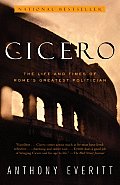 You probably pronounce it “sisero” as I did. However, my granddaughter’s taking Latin, and she took the opportunity to correct her grandfather. According to her, it’s “Kikero,” and it means “chickpea.” Cute. Something a mother might call her infant, but not the image of a great Roman orator. However, once I took a breath and plunged into Antony Everitt’s biography, Cicero became his noble self and quite a lot besides.
You probably pronounce it “sisero” as I did. However, my granddaughter’s taking Latin, and she took the opportunity to correct her grandfather. According to her, it’s “Kikero,” and it means “chickpea.” Cute. Something a mother might call her infant, but not the image of a great Roman orator. However, once I took a breath and plunged into Antony Everitt’s biography, Cicero became his noble self and quite a lot besides.

Little as I know of Roman history, I was only a few pages into this book before I realized I knew even less than I thought. Cicero was in on what most of us probably think of as the main events–the assassination of Julius Caesar, the wars between Pompey and Antony and Octavian and other great generals, the Cleopatra saga, among others. Of course, there was a lot more Roman history before and after this brief sixty or so years of Cicero’s life, but for us ignoramuses, these are likely the central legends that spring to mind. Cicero was not one of Caesar’s assassins, but he was a witness to the stabbing, sitting in his chair in the senate as it occurred, and one of the killers called to him from the forum, probably trying to pull him into the event as one who had fought hard to keep the senate independent, to hold off a dictatorship, and save the republic. Which was their rationale for the killing. As it turned out, Cicero managed to get into the aftermath and stay out of it at the same time.
Cicero was always at a disadvantage in politics because he came from an untitled family. His only leverage was his talent as a lawyer and an orator. He earned his keep and his climb to fame and prominence by winning cases and doing it with flourish and eloquence. He had the advantage of being able to polish his speeches before they were published–no “film at 11” in those days–so what’s written and what he actually said are undoubtedly at variance. However, what he said and how he said it was undoubtedly superior or he wouldn’t have attained prominence.
Prominence, however satisfying and advantageous, however, was also dangerous. One thing I learned here–a political enemy in Rome would hack you down as surely as an ISIS warrior beheads an infidel. Stabbings, beheadings, poisonings were all common measures to take your opponents down. Every legal case had a winner and a loser, So Cicero was in constant danger from losers, and he wasn’t beyond becoming a party to some executions himself, though he managed to keep his hands clean. Mostly. Sounds complicated? It is. read it and see.
In the end, he couldn’t quite outrun the surrounding conspiracies, but he managed to write and speak volumes of unparalleled prose. Unfortunately, Everitt includes very little of that in the book. I guess you’re supposed to either know it or go out and learn it. I would have liked more literature in his text, but I certainly liked the insight into the complex world of Roman politics. Everitt’s prose isn’t spellbinding, but it does the job, and Mr. Kikero is a fascinating subject. A worthy voume, Anthony. Thanks for it.
